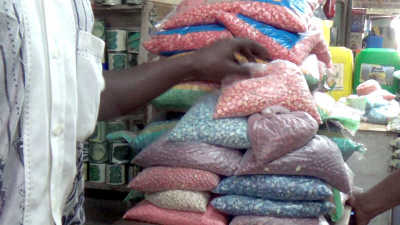Business
Fake seeds hurting Ugandan farmers

Many farmers in Uganda get a raw deal when purchasing seed
Godfrey Musoke, a renowned maize farmer from Mukono, is one of the many farmers who have suffered the financial cost of the fake seeds disaster.
He took me to one of his gardens – a rented six-acre piece of land on which he planted maize in the middle of March 2014.
He bought the seeds from his usual customers, a well-known seed company; used fertilizers, herbicides and labour that altogether cost him over 700,000 Uganda Shillings.
Musoke was however shocked to find that nearly 80 percent of the seeds he planted had failed to germinate one week after planting.
He said: “I planted six acres of seeds from a reputable company but almost 80 of them failed to germinate. I’ve lost about Ushs 700,000 altogether including cost of herbicides and labour.”
Godfrey planted two varieties. One that is favoured by his customers who buy fresh cobs for roasting and another type just close by to test its resistance to a new disease that has caused him more losses in another garden.
His favourite variety failed to germinate this time and he has had to respray the garden with herbicides and replant afresh. But the few kilos he planted besides the bigger field, germinated very well.
“Germination failure is a very common phenomenon,” says Musoke.
But as Prof. Morris Ogenga Latigo, the former Leader of Opposition in Uganda’s Parliament but with experience in farming noted, one week in farming can mean the difference between success and failure.
Indeed, while Musoke has had to replant new maize, lack of sufficient moisture in the soils that followed the second planting phase meant that germination was weak.
Unfortunately, seed companies are usually not willing to fully compensate farmers for the losses incurred.
“If you’re a major customer, the company may give you 50 percent compensation. But it’s nothing compared to the losses one incurs. What we usually do is ignore them and simply replant.”
Prof. Morris Ogenga-Latigo, the former Leader of Opposition in the Parliament of Uganda is another victim of counterfeit seeds. Latigo ventured into commercial farming in his home area in Northern Uganda three years ago after losing an election.
In the second season of 2012, Prof. Latigo bought and planted DK Hybrid Maize that is supposed to be imported from South Africa.
He had been excited by the same variety during a trip to South Africa and was elated when he was told that it is sold in Uganda.
Contrary to the usually uniform height of all hybrids, the height of the DK maize crops he got on his farm was so varied, which alerted him to the fact that he might have been duped.
“When we planted, it was like a local had just picked seeds from various neighbours. Some are this tall, others are short. Because I knew it was DK, I had used fertilizers, herbicides. At the end of it all, I ended up with a yield of 400 kilos per acre . That hits you hard in the pocket because you have invested so much.”
Chris Ibyisintabyo, the Executive Secretary of Uganda Seed Trade Association, (USTA), an umbrella body that brings together all seed companies in Uganda explains that indeed counterfeit seeds is a major problem affecting his members who now number 23 seed companies as well as their customers.
“One of the biggest problems we have in the country is that of fake seeds or counterfeit seeds,” says Chris.
Although USTA estimates that up to 30% of seeds sold in Uganda are counterfeit, the actual scale of the problem is actually not known because no survey has been carried out so far.
According to Chris, the problem has its roots in a number of factors. These include low level of capacity in research institutions that leads to less than needed foundation seed to be availed to seeds companies for multiplication.
Ibyishintabyo argues that fake seed finds its way onto the market because of weak inspections from the ministry of agriculture.
He argues that whereas the ministry has the mandate to inspect all the 23 seed companies in the country as well as the seed dealers, it is incapacitated to execute this mandate.
They are also supposed to supervise the way seeds are grown either by the seed companies or by out-grower farmers.”
“I think there about five inspectors in Uganda who are supposed to cover the whole country. But even those are not well facilitated,” says Ibyishintabyo.
Chris adds however that unscrupulous behaviour by a few individuals in the seed companies could be involved in packaging grain or expired seed and selling it to unsuspecting farmers as quality seed.
Added to that is the weak system right through the network that that fails control spread of fake seeds to farmers.
For instance, whereas seed vendors are supposed to be registered and licensed by the ministry of agriculture, very few, Chris says, have a licence that allows them to operate.
The result is that seed, despite its importance to the success of harvest, is traded just like any other item in Uganda.
As Prof. Ogenga-Latigo noted, seed vendors in Uganda are ordinary business people who care more about profit than their safeguarding reputation or the interests of the farmers.
The seed industry is governed by the Seeds and Plant Act of 2005. The Act sets tough punishments including a 4-year jail term for anyone who violates provisions such as those that prohibit the sale of seeds that are not sealed and labeled.
Few vendors or even farmers are even aware of this law, but also enforcement is very weak leading to frequent violations that are costly to farmers and the seed companies.
In addition to weak laws, many in the industry admit that farmers are not well sensitized on the different difference between fake and genuine seed.
Some seed companies have taken it upon themselves to pursue individuals that are are engaged in counterfeiting their own brands.
Farmers too are to blame for the persistence of the problem, as one vendor told me.
“Farmers want cheap things. If you tell them to pay Ushs 5000 for a kilo of higher yielding varieties, they will ask you whether there is an alternative that is cheaper. So you give them what they ask for.”
All is not doom and gloom however. There are some reassuring signs from the ministry and seed companies.
USTA in collaboration with the ministry of agriculture have taken steps to introduce measures like a hard-to-break plastic label that will be attached to seed containers so as to help farmers distinguish between genuine seed and counterfeits.
Efforts by this reporter to get a comment from relevant officials from the ministry of agriculture were not successful.
One hopes however that the government would put in more energies in addressing the challenge of fake seeds in the agricultural sector, the backbone of Uganda’s economy.
Comments


















